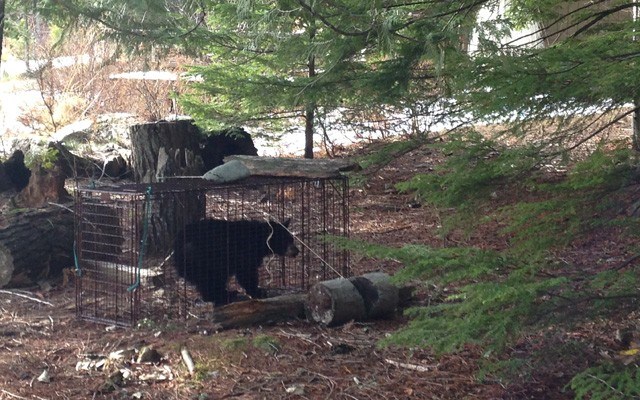Conservation officers are calling the number of orphaned bear cubs in the Sea to Sky “very unusual” after three were captured in Whistler and Pemberton over the last week.
On Saturday, Nov. 21, an underweight cub was captured in the Pemberton Meadows area and relocated to the Critter Care facility in Langley. Estimates put the cub at around seven kilograms, making it severely underweight for this time of year. "That Pemberton cub would never have made it through the winter," said Bear Smart director Sylvia Dolson.
A second cub was captured near Green Lake in Whistler on Sunday — only a week after a 10-month-old bear was trapped in the Taluswood neighbourhood.
“It’s another part of this huge group of orphaned cubs that we have this year that’s very unusual,” said Sgt. Simon Gravel with the Conservation Officer Service (COS).
Neither Gravel nor Dolson had a definitive explanation for the phenomenon.
“Everybody’s sort of at a loss as to why this is happening,” Dolson said, adding that it’s possible sow bears are being struck by vehicles or killed by hunters.
Gravel said the COS has seen an increase in orphaned bears in years where natural food sources are scarce — Whistler's alpine berry crop was decimated in the summer after an early bloom — but he's unsure why exactly that is. There's been some speculation that mother bears may be abandoning their cubs during lean food years, but Dolson said there's little science to back that theory.*
In an email to Dolson, bear researcher Dr. James Beecham said he is “unaware” of any scientific evidence suggesting sow bears leave their cubs behind due to a lack of natural food, particularly in the fall when they have typically already been weaned off their mothers.
“What is the advantage to an adult female abandoning a cub that is not dependent on her for food?” he wrote. “The more likely scenario is that the adult female is killed (legally or illegally) and the cubs are orphaned.”
The issue hasn’t been concentrated to the Whistler area, either. Dolson said that in recent days there have been orphaned bears either spotted or captured in North Vancouver, West Vancouver, Coquitlam and on the Sunshine Coast.
The influx of young bears means that Critter Care has had to make extra space to accommodate the cub captured in Whistler on Sunday. There are now 26 bears in care at the Langley facility.
What remains unclear is where any additional orphaned cubs will spend the winter if captured — including one that has been spotted around Cheakamus Crossing in recent weeks.
Bear Smart has suggested the Northern Lights Wildlife Society in Smithers as an option, and is calling on the community to pitch in to help cover some of the costs to make the 1,000-kilometre trip.
“At this moment, we don’t have the funds,” Dolson said. “I’d be really comfortable if we had a couple thousand dollars.”
Since making the social media call-out Sunday morning, Bear Smart has raised about $2,000 for its orphaned bear fund. Donations can be made at www.bearsmart.com/cause/donate. Dolson is also looking for any local pilots willing to donate their services to help transport cubs.
The COS acknowledged Smithers as an option for care, but Gravel said the provincial agency has yet to determine where any other orphaned bears from the Sea to Sky will end up.
"We need to have more conversations about the logistics and capacity to do something like bringing our bears (to) a remote area like this,” he said. “It’s important those live bears are released and relocated in their home range – their genetic pool — so a bear that will go to Smithers, by our policy, will need to be released back here.”
“You can imagine in the spring moving a 250-pound black bear is more complicated than a cub. We’ll have some discussions this week with our leadership, COS and different facilities to see if there’s other good candidates for a care centre.”
*An earlier version of this article indicated that officials at the COS believed that sow bears may have been abandoning their cubs due to a lack of natural food. While the COS has seen an uptick in orhpaned bears in poor food years, there's no indication that mother bears are leaving their cubs behind.




